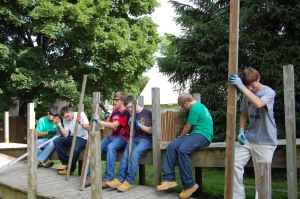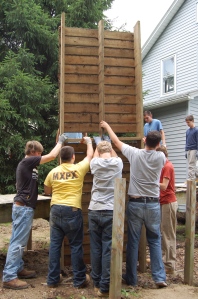“How wonderful it is that nobody need wait a single moment before starting to improve the world.”
— Anne Frank

esquire holland: sept. 17, 1958 -- august 9, 2011
SIDENOTE: i preached this sermon on 8-14-2011, just a few days after i found out my friend, esquire holland had died from an unexpected heart attack. i learned so much from her. i went to her funeral today, a celebration of her life, where it was obvious the impact she had on the world. she exemplified the life of someone who didn’t wait to change the world. for me, it was her smile that lit up the room, and the lessons she taught me about acceptance. i will miss her and the way she understood people. i love you esquire, and i know your spirit is here with me, and will be forever.
“ONE”
I met Esquire the first day of orientation at Drew Theological School. She sat in the back corner of the room, struggling to log in to her computer. A middle-aged African-American woman, I introduced myself to her and offered to help with her computer. We sat, talking for a little while before the orientation started. I learned that she had previously been a lawyer, hence her nickname, and was living in Montclair at the time, and would be taking the train from there everyday to Drew. As orientation went on, I was rather intimidated by her boisterous personality and thought it was getting a bit annoying that she made comments every few minutes while others were talking. However, I tried to look past those things and find the good in her – to “mine the gold” as my parents taught me growing up.
The orientation group I was a part of bonded quite well as there were only a handful of us starting school that January. As the semester kicked off, Esquire and I found ourselves both in the choir, but I still was unsure about her. However, she was always checking in on me and asking how I was doing. She called me by name (a big deal to me,) and remembered the littlest things I told her. I could tell that she was genuinely interested in my life, and wanted to know how it really was with ME, not just small talk. I talked more with her and learned that her call in life was to work with youth, most especially gay and lesbian teens who were struggling to find their place in the world because she, too, had experienced that. I admired her for that and thought, yes, God definitely is working through her and loves her despite how different she was from me. We talked and talked about youth ministry, and she was so encouraging, sending me messages like “I believe we will both be incredible gifts to the youth of tomorrow who yearn to know God as we do…” to me during rough patches of school and the busy-ness that we all know on a daily basis.
Despite what seemed like our one similarity – youth ministry — Esquire and I had completely different life experiences yet there was something that drew me to the friendship I gained with her. I’m not sure if it was her energetic spirit (much like mine), her smile that could light up a room, or perhaps God was cooking and blending up something that I didn’t know about yet. I leaned more toward that one, and even told a few people that I was sure God put Esquire in my life for a reason.
A few months ago, she told me that she was going to have to take a leave of absence from Drew because of health issues, and she was continuously in my prayers. As that semester began, I missed seeing her bright smile and energetic presence in the choir and in my classes and even just in the hallway. She was such a light in our community, and there was something missing when she wasn’t there. When she came to visit, I practically jumped onto her, and could hear her laugh when she walked in the building. I prayed for her daily, and was SURE that God was watching out for her.
Just three days ago, I was having dinner with the director of the chapel at Drew’s daughter who got a text from her mom that said a theological student had died. My heart sunk into my stomach and I got really nervous, and immediately checked my Drew email. The email was right there – “Sad news about Esquire Holland.” Esquire had died that morning from an unexpected heart attack. I was in shock. No, not my friend – not the one who was doing great things for and through God and working so hard to help the youth of this world.. Not the one who brought such light and energy to a community. But it was true. I sat, took a deep breath and began processing what that means. And why such a kind soul would be taken so early. However, as emails circulated around the Drew community, someone brought up how as Christians, we are people who believe that life conquers death and through that, we have many lessons to learn. Sometimes it is people who help us learn those lessons. In this case, it was Esquire, through our differences, who taught me that we are all one, no matter who we are.
In today’s scripture, Jesus learns something from the Canaanite woman. The gospel lesson today lands us with Jesus in a place near Syria, where it says that he went away – almost as if to get away what had happened earlier in the chapter – a conflict between the Pharisees and the scribes over tradition and authority. It was like he was on vacation, trying to get some quiet time. He was a busy person! As he was traveling, a woman came up to him. This wasn’t just any woman, but a Canaanite woman. Canaanites were considered to be Israel’s pagan enemies, and were Gentiles. We know from the scriptures that both women and Gentiles were marginalized, and not so much around jesus and his disciples, yet she somehow knew that Jesus was not just any person. She knew that there was something special about him. She knew he was the messiah, the JEWISH messiah – in fact, calling him “Lord, Son of David” which is the Jewish messianic title. She then proceeds to ask him to heal her daughter who has been tormented by a demon. But, Jesus doesn’t answer. He completely ignores her.
We don’t like to think about Jesus as being anything except for loving. But to IGNORE someone? Then the disciples even want to send her away. Then, Jesus responds. “I was sent only to the lost sheep of the house of Israel.” At that moment, Jesus thought his ministry was only for the people of Israel. The woman persists. She makes it quite clear that no, even others get the “crumbs” or the leftovers – she thinks that she is able to receive Jesus’ healing power. She is not kidding around. This woman is showing Jesus that she has faith in the compassionate God of Israel, not in Gods that are vengeful and angry. This woman insisted to Jesus that surely the God of Israel cared for her, loved her even though many people at the time called her a “dog” or undesirable. Jesus recognizes this, and sees that her faith is great, and her daughter is healed. Jesus comes to realize that yes, she, too is a beloved child of God – the God that Jesus knows. And she deserves to be loved and treated like so. Despite her ethnic differences, Jesus and the woman have that in common – they are loved by God.
This is a significant turning point in Jesus’ ministry, as he heals a woman he didn’t think that was part of his mission. However, Jesus learns from this that his ministry extends passes the reaches of his own understanding, to people he wouldn’t normally encounter on a daily basis. We sometimes forget that Jesus, too, was human. We focus so much on him up on the cross, or as resurrected. But like us, Jesus had to learn lessons. Those lessons sometimes come in ways that are unexpected.
We have people in our society who are like the Canaanite woman. We come across them and don’t bother starting a conversation because they are different or not “one of the chosen.” We walk by them on the streets or ignore them when they ask for food or money. We often forget that we probably have more in common with them than we thought. They probably have a different perspective of the world around them, and we can actually learn things from them. Yet, despite our differences, we find commonalities. Perhaps that we are all the children of God? Yes, I think when it comes down to it, that commonality is the most important of all of them. It is what makes us one, and what unites us.
A few weeks ago, I went to see U2 in concert at the New Meadowlands Stadium. It was amazing, and quite the spiritual experience. Having 95,000 people singing along with Bono was just incredible. When I go to concerts, I like to get out before the rush but as Matt and I were getting ready to leave, I heard the opening guitar notes to the song One by U2, off their Achtung Baby album. I looked at Matt and said, “we can’t leave yet.” It was absolutely moving hearing those same 95,000 people sing together the following:
“one love, one blood, one life. You got to do what you should. One life with each other – sister,s brothers. One life but we’re not the same. We get to carry each other, carry each other.”
I looked around and saw how different all of us are, yet we were united together in the same thing: God’s compassionate love for us. As we sang our hearts out while that song was playing, I began to think of all the people who are different from me – whteher it is race, religion, politics, etc, and realized that yes, we are different but because of that, we learn that God loves even them.
Bono retells the story of the Jewish sheepherders on the road to meet Pharoah when talking about equality and justice, how we are all one:
“You know, think of those Jewish sheepherders going to meet the pharaoh, mud on their shoes, and the pharaoh says, ‘equal?’ a preposterous idea: rich and poor are equal? And they say, ‘yeah, equal. That’s what it says here in this book. We’re all made in the image of god’
And eventually the pharaoh says, ‘okay, I can accept that. I can accept the jews- but not the blacks. Not the women. Not the gays. Not the irish. No way, man”
We can’t do that. We can’t think that because we accept one type of person,thoe others are all okay. We know that God is with us – with all people.
“God is in the slums, in the cardboard boxes where the poor play house. God is in the silence of a mother who has infected her child with a virus that will end both their lives. God is in the cries heard under the rubble of war. God is in the debris of wasted opportunity and lives, AND [most importantly] God is with us if we are with them”
God is with us – if we are with those on the margins. Those who we think are weird or different. We are able to carry one another through this crazy road called life. God calls us to do that. To remember that God says that we are all made in the image of God, no matter who we are. We are all the beloved children of God. Sometimes, in the death of a close friend who knew God loved everyone and showed that so passionately, and through the words at a rock concert, we are gently reminded that God loves the caananites of our world, and the ones who are different from us who we would rather exclude and ignore than include and have conversation with. Like Jesus, we must take with us the understanding that our God is a compassionate one and our ministry extends beyond the reaches of our immediate world. May it be so. Amen.












